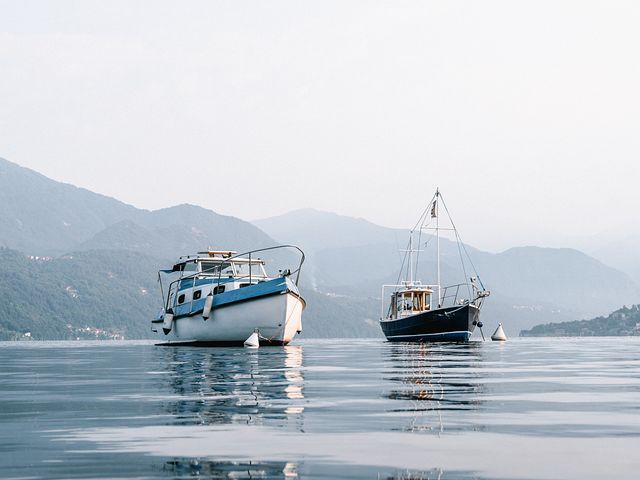How Should You Pass a Fishing Boat: Tips and Guidelines
Are you planning to go boating this summer? It's essential to know how to share the water with other boats, especially fishing boats. Fishing boats are slower and more delicate than other vessels, and they require specific passing rules to keep everyone safe.
This article will guide you on how to pass a fishing boat safely and efficiently. You'll learn about the dos and don'ts when sharing the water with fishing boats, what to do in different situations, and how to communicate with the boat operator. Let's get started.
Learn how to pass a fishing boat safely and efficiently with our guidelines and tips. Discover the dos and don'ts when sharing the water with a fishing boat, what to do in different situations, and how to communicate with the boat operator.
Introduction
Boating is a popular recreational activity enjoyed by millions of people worldwide. However, with the increasing number of boats in the water, it's essential to practice safe boating to prevent accidents and injuries. One of the essential aspects of safe boating is knowing how to pass a fishing boat.
Fishing boats are smaller and slower than other vessels, and their operators may not have a clear view of the surrounding area. Therefore, it's crucial to pass them carefully to avoid accidents and respect their fishing activities. Here are some guidelines on how to pass a fishing boat safely and efficiently.
How Should You Pass a Fishing Boat?
When passing a fishing boat, the golden rule is to be courteous and cautious. Here are some dos and don'ts to keep in mind:
Dos
1. Approach the fishing boat at a slow speed, and keep a safe distance.
2. Give the boat operator a friendly wave and make eye contact.
3. Slow down and prepare to pass once the boat operator acknowledges you.
4. Pass the fishing boat at a safe distance, which is generally 100-200 feet, depending on the boat size and speed.
5. Maintain your speed and direction once you pass the fishing boat.
6. Keep an eye on the fishing lines and avoid crossing them.
Don'ts
1. Don't approach the fishing boat at high speed or make sudden turns that could create waves or turbulence.
2. Don't pass too close to the fishing boat, as this could endanger the boat operator and disturb their fishing activities.
3. Don't throw trash or disturb the water near the fishing boat.
4. Don't blast your horn or make loud noises that could startle the boat operator or scare away the fish.
What to Do in Different Situations
Sometimes, passing a fishing boat can be challenging, depending on the situation. Here are some scenarios and what to do in each case:
When the Fishing Boat is Anchored
If the fishing boat is anchored, you should pass it on the side opposite to the anchor. This way, you won't disturb the fishing lines, and you'll avoid the risk of getting entangled in the anchor.
When the Fishing Boat is Moving
If the fishing boat is moving, you should pass it on the starboard side, which is the right side of the boat when facing forward. This is the standard passing side for boats in the United States.
When the Fishing Boat is Trolling
If the fishing boat is trolling, it means that it's moving slowly while dragging fishing lines behind it. In this case, you should pass the boat at a safe distance and avoid crossing the fishing lines. If you need to cross the lines, do it slowly and carefully, and make sure the boat operator knows your intentions.
How to Communicate with the Boat Operator
Communication is key when passing a fishing boat. Here are some tips on how to communicate withthe boat operator:
1. Make eye contact and wave to the boat operator to let them know that you see them.
2. Use hand signals to indicate your intentions. For example, point in the direction you're going to pass or give a thumbs up to signal that everything is okay.
3. Use your horn to signal your presence if necessary. However, avoid blasting it, as this could startle the boat operator and cause a dangerous situation.
FAQs about Passing a Fishing Boat
1. What is the safe passing distance when passing a fishing boat?
- The safe passing distance when passing a fishing boat is generally between 100-200 feet, depending on the size and speed of the boat.
2. Should I pass a fishing boat on the port or starboard side?
- If the fishing boat is moving, you should pass it on the starboard side, which is the right side of the boat when facing forward. If the fishing boat is anchored, you should pass it on the opposite side of the anchor.
3. Can I cross the fishing lines when passing a fishing boat?
- You should avoid crossing the fishing lines when passing a fishing boat. If you need to cross them, do it slowly and carefully, and make sure the boat operator knows your intentions.
4. What should I do if the fishing boat operator signals me to stop?
- If the fishing boat operator signals you to stop, you should slow down and stop your boat. The operator may need to retrieve fishing lines or adjust their position, and it's essential to give them enough space to do so.
5. Should I make loud noises when passing a fishing boat?
- No, you should avoid making loud noises when passing a fishing boat, as this could startle the boat operator or scare away the fish.
6. Is it okay to throw trash near a fishing boat?
- No, you should never throw trash near a fishing boat. It's not only disrespectful but could also harm the fish and the environment.
Conclusion
Passing a fishing boat may seem simple, but it requires caution and respect for the other boaters' activities. Remember to approach the fishing boat at a slow speed, give the boat operator a friendly wave, and pass at a safe distance. If the fishing boat is anchored, pass it on the opposite side of the anchor. If the fishing boat is moving, pass it on the starboard side. Finally, communicate with the boat operator and avoid making loud noises or throwing trash near the boat.
By following these guidelines, you'll not only have a safer boating experience but also show respect for the fishing community. Happy boating!








